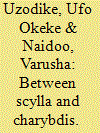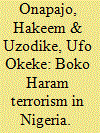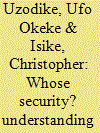| Srl | Item |
| 1 |
ID:
053873


|
|
|
| 2 |
ID:
117645


|
|
|
|
|
| Publication |
2012.
|
| Summary/Abstract |
Since the July 2009 Boko Haram terrorist outburst in Nigeria, there have been increasing questions on the phenomenon in the country. There has not been any substantial analysis on the emergence of the Boko Haram group and its terrorist activities in Nigeria as the out-rage continues. This study is advanced to explain the phenomenon of Boko Haram terrorism in Nigeria. It employs the levels of analysis framework popular in the field of international relations to explain the terrorism at three major levels: individual, state and international. The study relies on dependable news reports, which include interviews with key actors relevant to the subject matter, and finds that Boko Haram terrorism has its roots in the ideology and motivations of its founder and members, the failures and deficiencies of the Nigerian state, and the modern trend of religious terrorism in the international system.
|
|
|
|
|
|
|
|
|
|
|
|
|
|
|
|
| 3 |
ID:
097702


|
|
|
|
|
| Publication |
2009.
|
| Summary/Abstract |
This article takes an in-depth look at the Niger Delta crisis from two divergent but
mutually reinforcing security conceptions, namely national versus people security. It
contends that while the Nigerian government views security from the traditional statecentric
viewpoint and accordingly acts to 'secure' the region, the people view security
from a broader human-centric perspective, and thus responds negatively to state
securitisation/militarisation. This clash of security perspectives sets the stage for and
perpetuates armed conflict in the region as the net result of both sides' insistence on
'securing' their interests, resulting in a situation of mutual antagonism as they bring
to bear their often considerable coercive capacities. Therefore, the broad question the
paper grapples with is whose security is paramount, and against what threats is it aimed.
It reaffirms the need for a paradigm shift in the focus on security by the Nigerian
state from a state-centric perspective that views the people's agitation/resistance as
'terrorism', to a human-centric perspective that will justify its Lockean essence. This is
essential, because the federal government's militarisation of the region fans the flames of
ethnic-nationalism, exacerbating violence and perpetuating criminality with attendant
destabilising consequences for Nigeria's economy and statehood.
|
|
|
|
|
|
|
|
|
|
|
|
|
|
|
|